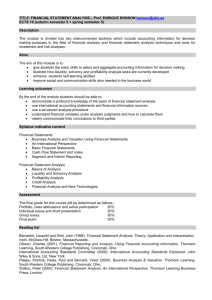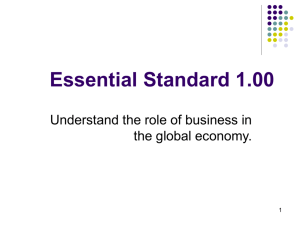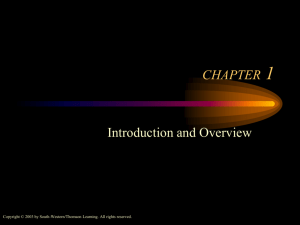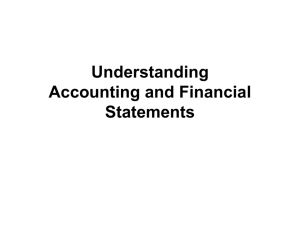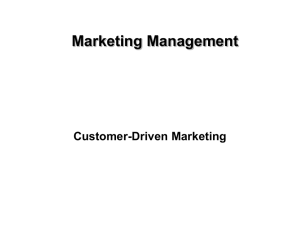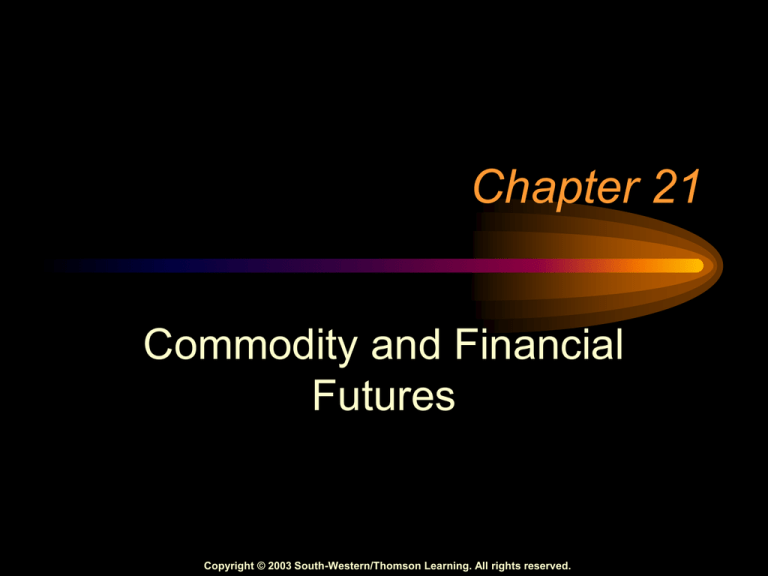
Chapter 21
Commodity and Financial
Futures
Copyright © 2003 South-Western/Thomson Learning. All rights reserved.
Commodity and
Financial Futures
• A formal agreement (contract) for
–the delivery (seller) or
–receipt (buyer) of a commodity
• Participants in futures markets are
either
–speculators or
–hedgers
Copyright © 2003 South-Western/Thomson Learning. All rights reserved.
Positions
• Speculators buy or sell contracts in
anticipation of price changes
• The long position anticipates price
increases
• The short position anticipates price
decreases
Copyright © 2003 South-Western/Thomson Learning. All rights reserved.
Futures Contracts
• Contracts establish a futures price
• The current (spot) price may be
–lower
–higher
Copyright © 2003 South-Western/Thomson Learning. All rights reserved.
Open Interest
• Number of contracts in existence
Copyright © 2003 South-Western/Thomson Learning. All rights reserved.
Closing a Futures Contract
• Close a position in a futures
contract by entering into the
opposite position
• A contract to sell "offsets" a
contract to buy
• A contract to buy "offsets" a
contract to sell
Copyright © 2003 South-Western/Thomson Learning. All rights reserved.
Futures and Leverage
• Futures offer large profits and
losses
• The source of the leverage: the
small margin requirement
• The margin requirement is a small
percentage of the value of the
contract
Copyright © 2003 South-Western/Thomson Learning. All rights reserved.
Margin
• Margin: a good faith deposit
required of both
–the long position and
–the short position
Copyright © 2003 South-Western/Thomson Learning. All rights reserved.
Marking to the Market
• Futures positions are "marked to
the market" daily
• Funds are transferred between
accounts
• Futures prices are allowed to
change only by the "daily limit”
Copyright © 2003 South-Western/Thomson Learning. All rights reserved.
Maintenance Margin
• A second margin requirement
• If funds in the account fall below
the maintenance margin
requirement, the investor receives
a "margin call”
• Failure to meet the margin call
results in the position being closed
Copyright © 2003 South-Western/Thomson Learning. All rights reserved.
Hedgers
• Buy and sell contracts to offset
existing positions
• Are growers and other users of
commodities
• Wish to reduce the risk of loss from
price fluctuations
Copyright © 2003 South-Western/Thomson Learning. All rights reserved.
Hedgers
• Pass the risk of loss to the
speculators
• Take the opposite positions of the
speculators
• Forego the possibility of a large
return to obtain future price
certainty
Copyright © 2003 South-Western/Thomson Learning. All rights reserved.
Non-Commodity Futures
• Financial futures
–contracts for the future delivery of
a financial asset
• Currency futures
–contracts for the future delivery of
a currency
Copyright © 2003 South-Western/Thomson Learning. All rights reserved.
Stock Index Futures
• Based on an index of stock prices
• Speculators buy and sell stock
index futures in anticipation of
changes in stock prices
• Portfolio managers use stock index
futures to hedge against
movements in stock prices
Copyright © 2003 South-Western/Thomson Learning. All rights reserved.
Programmed Trading
• Combines
– stock index futures and
– computer's ability to enter large
numbers of buy and sell orders
• Takes advantage of small
differences in
– stock index futures prices and
– prices of the underlying stock
Copyright © 2003 South-Western/Thomson Learning. All rights reserved.
Programmed Trading
• The process of programmed trading
Copyright © 2003 South-Western/Thomson Learning. All rights reserved.
Futures Pricing
• Futures prices generally exceed
spot prices
• The current futures price may
reveal the consensus concerning
anticipated prices in the future
Copyright © 2003 South-Western/Thomson Learning. All rights reserved.
Swap Agreements
• A "swap" agreement
–a contract in which the two parties
trade payments
Copyright © 2003 South-Western/Thomson Learning. All rights reserved.
Currency Swap
• In a currency swap, the two parties
–agree to trade payments in
different currencies
–helps manage exchange rate risk
Copyright © 2003 South-Western/Thomson Learning. All rights reserved.
Other Swap Agreements
• In an alternative type of swap, one party
trades a fixed payment for a variable
payment
• The “counter party” swaps the variable
payment for the fixed payment
• The swap helps management reduce
the risk from changes in interest rates
Copyright © 2003 South-Western/Thomson Learning. All rights reserved.
Equity Swap
• Two parties swap payments based
on an index of stock prices
• Swap payments are made based
on the extent that the price indices
differ
Copyright © 2003 South-Western/Thomson Learning. All rights reserved.

